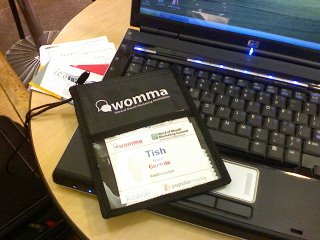Update: The Danes Think Madonna's Concert's Blasphemous, too but not for religious reason.
Here's why the Danes are pissedThe Danish media overnight slammed US pop diva Madonna for giving an open-air concert that was nothing more than a "music video", saying it was a "scandal" that many of the 85,000 spectators could not see their idol.
Imagine that! Apparently someone forgot to inform the Danes that when one attends a 700 kroner ($150)a seat conference, they shouldn't *expect* to see much more than "figures as small as matchsticks singing and dancing on a distant stage." Sheesh! If they *really* want to *see* someone like Madonna, they're going to have to spend a heck of a lot more than they did. Do they think she's a philanthropist or something?
Well, the World's
bowels are in an
uproar over the latest bid for attention from that great media whore, Madonna...
Seems that for her new tour, she's had cross constructed of mirrored panels, which she then hangs herself from and sings cheezy-assed "Live to Tell"...
How Danceteria/Studio 54 of her...
Rob Harvilla in the
Village Voice aptly labelled this latest act of a pathetic Middle-Aged Material Girl a "sequence unparalleled in its combination of blasphemy, absurdity, melodrama, humanitarian grandstanding, and preposterous narcissism. . ." (yet Harvilla later backpedals on this one)
or are we just a bit nostalgic for Spinal Tap?
Catholic spokesman Manfred Becker-Huberti (in Germany)
pointed out a seriously ugly irony to this stunt: "If someone had tried to portray Mohammed this way, there would
have been a revolt."
Correction: it would have started another war, possibly outside of the Middle East.
But Catholics aren't allowed to say anything about this because, if they do, they're being "poor sports" who can't take a joke. We should *love* the material girl for giving because she's so daring....and aren't all those Catholics just a bunch of pedophile Papists anyway??
Heck, even sweet little religion professor
Donna Freitas boldly went on NPR and told everyone she thinks the Pathetic Old Broad's latest media vulgarity is a truly "feminist" statement about Christianity. "she's opening our eyes!" cries Freitas....
ah, the future is now so bright for feminism *and* biblical scholarship that I'm gonna have to wear shades!
Christians, though, are going in the wrong direction to evaluate this latest publicity stunt as "blasphemous." The "B" word only ends up making all those lovely capitalists, who will gladly sell sex as a recreational activity to pre-pubescent kids, laugh at anyone of faith. They revel in making us all look like a bunch of bible-thumping reactionaries.
Blasphemy! How 15th century! Get into the 20th century guys! Blasphemy is good! It's enlightening!
However, from a media as well as progressive christian perspective, here are some very good reasons why
faux Jew Madonna deserves to vanish in a ball of celluloid flame:
First, let's look at Freitas' claim that so many laugh when asked to depict a woman on the cross--and that Madonna doing this is good because it challenges those folks assumptions. Wrong way to do with this argument, my fishing feminist friend: mostly because of what Madonna, in particular, represents--capitalism run amock, and a particular psychological condition that makes her ferrit out publicity by Any Means Necessary.
Do any women who own their sexualities and their spiritualities really want this particular woman representing All women? Think about it...
And think about this: perhaps her Act is, after all, that of a desperate woman whose over-priced tour tickets have been selling outside of NYC at a pace that could be called somewhat less-than-hotcakes. Or at least less than the kind of hotcakes Herself prefers...
Now, from the sidelines, I can hear the pop culturati, so hiply a-theistic and smart on all things religion, say "but wasn't Jesus's crucifixtion also a publicity stunt of some kind? wasn't he also committing blasphemy?"
In the eyes of the Sadducees, he was a blasphemer by not keeping the sabbath nor keeping kosher. However, he also perfomed a number of very generous, and noble acts that set him apart from others. He was a tireless defender of women (the story of the widow's mite, his advice to the Samaritan woman), healed people without ever asking for a dime in return (wow, how un-Madonna of him), didn't push children from the table, didn't think the rich were all that blessed....and didn't make any money for preaching in public.
He also died an ignominious death, that was only a footnote in Roman historian Pliny's writings--the Entertainment Weekly of its day. It wasn't front-page news to Rome.
Still I'm sure Madonna, in some delusion of grandure, would like to us to view her charity work and AIDS activisim along the lines of Christ-like acts. And I'm sure her Hollywood Kaballa mentor (a man more concerned with selling a profound mystical tradition to a bunch of poseures than in following Maimonides' advice on the matter) would gladly support her delusion...
Yet consider this: Madonna's generosity has always been amply offset by the bazillions of bucks she's made by selling herself.
If Jesus had sat back and thought about whether or not it would make people love him and give him money if he healed the woman who had been bleeding for 12 years, he never would have done it.
And nobody ever paid him for the Sermon on the Mount. There were no tickets to that event. In fact, it was he who ended up having to pull a miracle and feed the people who showed up.
With Madonna, there is never any sacrifice remotly reflective of Christ's acts on her part. Never any true sacrifice of money nor of self.
Many believe Jesus sought to reconcile the world. But whatever he did, he certainly did not reconcile his bank account. So, let's get some historical and pop cultural perspective here: Madonna's acts of charity are more like those of Madams of Medieval Germany--who funded hospitals and orphan aslyumns with their earnings, while also hoping word of their good Acts would compel the scions of the bourgeoisie to continue to support their particular establishments over a competitors'. Is Madonna, like the Madams, also assuaging her guilt through her charitable acts? Does she believe there will be an Indulgence at the end of the line for her?
It's all business, baby.
One final thought: have we in Western society sunk so low as to accept a middle-aged, overly-horny (please, give the woman some saltpeter!) rapacious capitalist portraying herself as the Redeemer?
Then again, maybe those pasty-faced eschatologists on CNN are right. and if so, will my cell phone work after the Rapture?
Journalism,
citizen journalism,
media
 A book from her work Moving a Nation to Care: Post-Traumatic Stress Disorder and America’s Returning Troops. has finally hit the "review copy" status, and is on time for its May '07 release.
A book from her work Moving a Nation to Care: Post-Traumatic Stress Disorder and America’s Returning Troops. has finally hit the "review copy" status, and is on time for its May '07 release.





